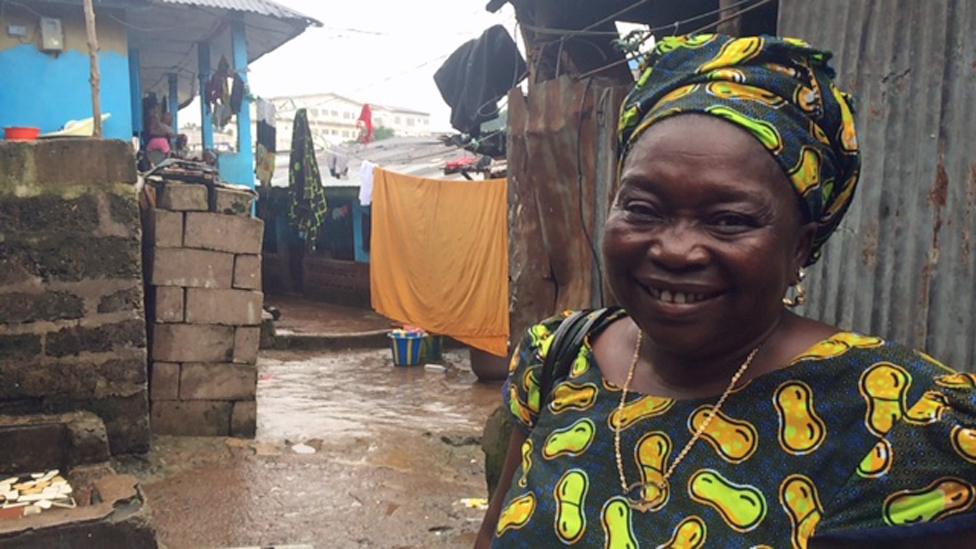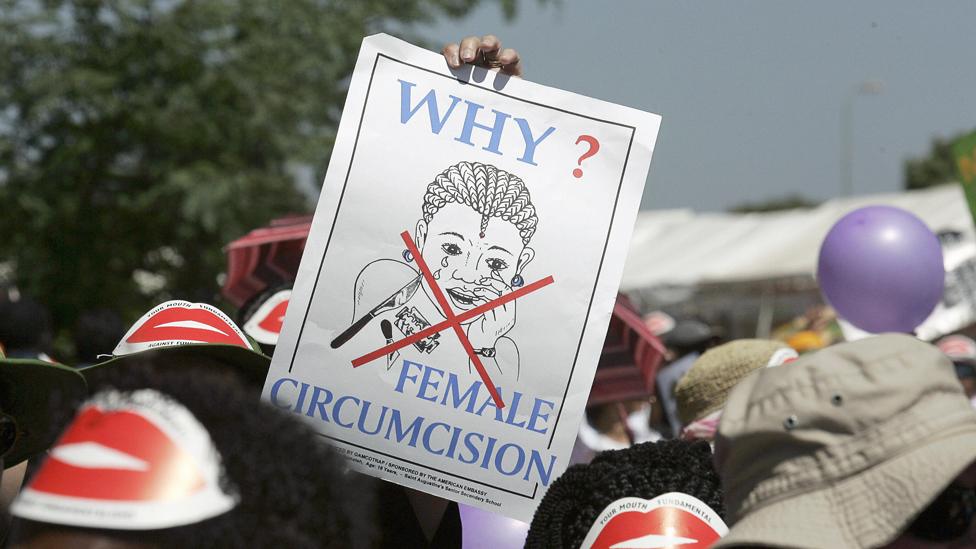My quarrel with a proud FGM cutter
- Published

More than 200 million women and girls alive today have undergone female genital mutilation (FGM) or cutting. The practice has now been outlawed in some African countries, but not in Sierra Leone, where some cutters are still proud of their profession.
"I have initiated hundreds of girls," Memunatu Turay proclaims proudly. "But I can't tell you exactly how I undertake this ancient tradition, unless you join our secret society."
A big grin spreads across Memunatu's face, as she no doubt sees the pure horror unfold on mine. "Come with me," she says. "I can cut you and only then can I tell you what you want to know."
Memunatu is clearly enjoying this exchange, eventually bursting into fits of laughter. I politely decline her offer.
We're sitting in her home in a slum area of western Freetown. A photo of her daughter in her college robes hangs in pride of place on a bright yellow wall. "She's been cut and look, she's fine - she's getting an education," Memunatu says, her large round face lighting up.
Find us on Facebook , external
This 56-year-old is simultaneously warm and fierce. She boasts that she is one of the most trusted and prolific cutters - or soweis as they're called in Sierra Leone - in all of Freetown. "It's a great and ancient tradition," she insists.
"We don't hurt girls, I would never hurt them.
"And it's not just about circumcising. We teach them how to be wives, how to cook and clean.
"We have big parties for the initiations where we dance and sing, and feel good."
My mind goes back to July when I was in Kenya investigating efforts to end FGM there. The practice was outlawed in the country in 2011. My experience in a village there is something that has stayed with me. One former cutter agreed to demonstrate what she used to do to young girls.
Her friend grabbed hold of my wrists, crossed them tight against my chest, and pulled me down to the floor outside her hut. I sat between her strong legs as she tightened them around my hips making it impossible for me to move. She was an older lady and I couldn't figure out where all that strength had come from.
FGM is still all too common in Kenya, as Tulip Mazumdar reports
Then, the former cutter opened my legs and showed me - using an oval shape she made with her thumb and index finger - how she'd scoop out the inside of the girl's vaginal lips with a blade, and cut out the clitoris, discarding it all on the ground. I felt sick to my stomach.
After that strange and terrifying experience, hearing girls' stories of how they were cut became even more distressing. Three words repeatedly came up when they described their experiences: fear, agony and betrayal.
It was their own mothers, their grandmothers, their aunts - the women in their families - who had led them into their painful and degrading initiations. And here I was in Sierra Leone, a country where the majority of women have been cut, sharing pleasantries with a professional and proud cutter.
It wasn't long before we got onto the finances of Memanatu's profession. She tells me she receives around one million Leones - that's about £140 ($180) - for every girl she cuts. She is also given palm oil, goats, and bags of rice. In a country where two-thirds of people live in poverty, being a cutter is quite the money-maker.


Find out more
From Our Own Correspondent has insight and analysis from BBC journalists, correspondents and writers from around the world
Listen on iPlayer, get the podcast or listen either on the BBC World Service, or on Radio 4 on Saturdays at 11:30
You can hear Custom of Cutting on BBC World Service on Monday 21 November

What about the pain and trauma caused by cutting? And the deaths? Memunatu isn't having any of it. "It's all lies," she tells me. "It's good for the woman. One man is not enough for a woman who has not been circumcised," she continues. "But when she is initiated, she becomes sexually contented and sticks to just one man."
I have to admit, I felt anger.
"You and I are both women," I protest. "I have not been circumcised and I am not promiscuous. Having a clitoris doesn't mean you feel compelled to have sex with lots of men."
She laughs and grabs my arm, pressing it against hers. "You are different to us," she tells me. "Look, you are yellow in colour, I am black. We are both women but we are not the same. You will never understand."
I ask Memunatu what she would do if the government banned the practice. "We would storm the offices of the president," she bellows. "They know this is an important tradition. Many of them are in our secret society."
After ranting about the injustice of it all she takes a deep breath. "If they want us to stop," she says, "they will have to find something else for us to do. If you want to wean your baby off breast milk you provide alternatives, don't you?"
I put to her that if this is her logic, then initiations for her are more about cold hard cash than ancient traditions. "It's about both," she says.
Join the conversation - find us on Facebook, external, Instagram, external, Snapchat , externaland Twitter, external.